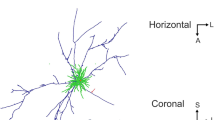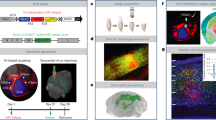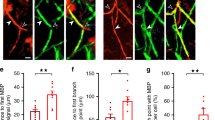Abstract
THE disappearance of neurones from the primate lateral geniculate body after de-afferentation has been clearly demonstrated1, and less dramatic transsynaptic degenerative changes have been described elsewhere in the central nervous system, for example, in the cortex of the piriform lobe after degeneration of the olfactory tract2. Hitherto, however, attention has been focused on the perikaryon, and the role of afferent input in preserving the normal dendritic organization of neurones has apparently never been studied.
This is a preview of subscription content, access via your institution
Access options
Subscribe to this journal
Receive 51 print issues and online access
$199.00 per year
only $3.90 per issue
Buy this article
- Purchase on Springer Link
- Instant access to full article PDF
Prices may be subject to local taxes which are calculated during checkout
Similar content being viewed by others
References
Clark, W. E. Le Gros, and Penman, G. G., Proc. Roy. Soc., B, 114, 291 (1934).
Allison, A. C., J. Anat., Lond., 88, 481 (1954).
Brodal, A., Brain, 70, 179 (1947).
Cajal, Santiago Ramon y, “Studies on the Cerebral Cortex” (Lloyd-Luke, Ltd., London, 1955).
Author information
Authors and Affiliations
Rights and permissions
About this article
Cite this article
JONES, W., THOMAS, D. Trans-Synaptic Atrophy in the Cerebral Cortex. Nature 178, 47–48 (1956). https://doi.org/10.1038/178047b0
Issue Date:
DOI: https://doi.org/10.1038/178047b0
Comments
By submitting a comment you agree to abide by our Terms and Community Guidelines. If you find something abusive or that does not comply with our terms or guidelines please flag it as inappropriate.



